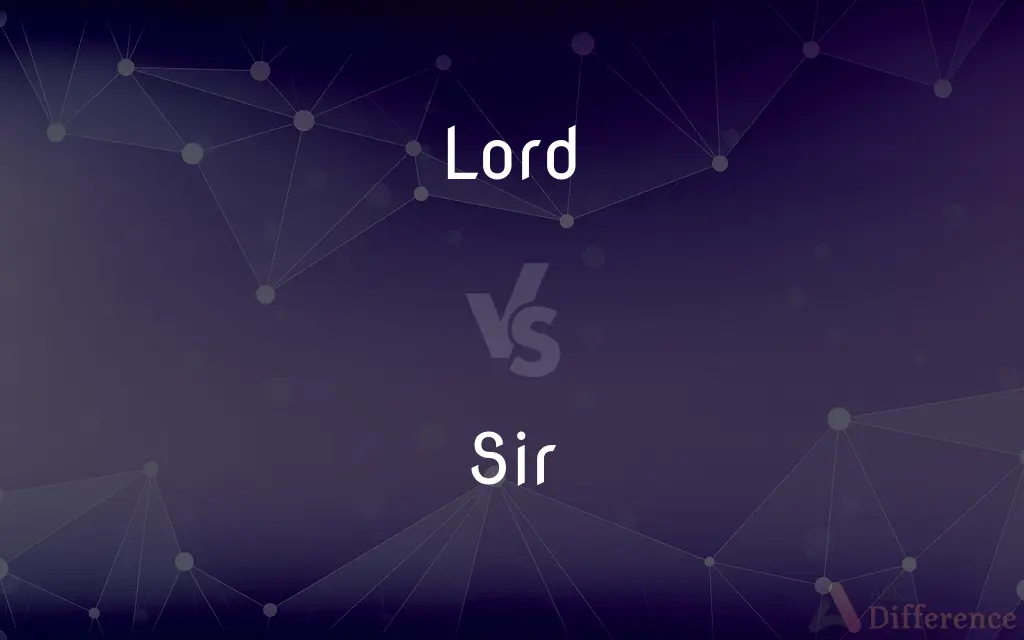Lord vs. Sir — What's the Difference?
Edited by Tayyaba Rehman — By Fiza Rafique — Updated on September 21, 2023
"Lord" is a hereditary or life title for British nobility, often associated with land ownership or political influence. "Sir" is a title given to knights and baronets, generally emphasizing chivalric accomplishments.

Difference Between Lord and Sir
Table of Contents
ADVERTISEMENT
Key Differences
The term "lord" is a title often granted to those belonging to the higher echelons of British nobility. It is generally a hereditary title, passed down from generation to generation, although life peerages can also be granted. The title is often associated with ownership of land, as many lords own estates.
Conversely, "sir" is a title given to individuals who have been knighted by the British monarch. Unlike "lord," the title "sir" is not hereditary and is not passed down through generations. Knights and baronets are generally people who have been recognized for their contributions to society, whether that be in the arts, sciences, or other fields.
One key distinction between "lord" and "sir" is in the scope of their use. The title "lord" is often accompanied by a territorial designation, linking the individual to a particular estate or region. "Sir," however, is a standalone title that precedes the individual's first name, and it does not indicate territorial influence.
While both "lord" and "sir" are forms of address that indicate a certain social status, they are used in different contexts and convey different types of respect and responsibility. While a "lord" may have political influence and substantial land holdings, a "sir" is generally recognized for individual achievements, often of a chivalric or humanitarian nature.
Comparison Chart
Hereditary
Often Hereditary
Not Hereditary
ADVERTISEMENT
Associated With
Land Ownership, Political Influence
Chivalric, Artistic Achievements
Precedes
Surname or Full Name
First Name
Territorial Designation
Often Included
Not Included
Rank
Higher Nobility
Knight or Baronet
Compare with Definitions
Lord
A hereditary or life title for British nobility.
Lord Grantham owns a large estate in the countryside.
Sir
A title for a knight or baronet.
Sir Galahad was a legendary knight.
Lord
An honorific indicating higher social rank.
Lord Nelson was a key figure in the British Navy.
Sir
A title given by the British monarch.
Sir Paul McCartney was knighted by Queen Elizabeth.
Lord
A title often linked with territorial ownership.
Lord of the Manor implies control over a specific area.
Sir
An honorific for persons of distinguished merit.
Sir Isaac Newton made groundbreaking contributions to science.
Lord
Lord is an appellation for a person or deity who has authority, control, or power over others, acting as a master, a chief, or a ruler. The appellation can also denote certain persons who hold a title of the peerage in the United Kingdom, or are entitled to courtesy titles.
Sir
An informal address to superiors in military settings.
Yes, sir, understood!
Lord
A king.
Sir
Sir is a formal English honourific address for men, derived from Sire in the High Middle Ages. Traditionally, as governed by law and custom, "Sir" is used for men titled as knights, i.e., of orders of chivalry, and later also applied to baronets and other offices.
Lord
A territorial magnate.
Sir
Sir Used as an honorific before the given name or the full name of baronets and knights.
Lord
The proprietor of a manor.
Sir
Used as a form of polite address for a man
Don't forget your hat, sir.
Lord
Lords The House of Lords.
Sir
Used as a salutation in a letter
Dear Sir or Madam.
Lord
Used as a form of address for a marquis, an earl, or a viscount.
Sir
A man of a higher rank or position.
Lord
Used as the usual style for a baron.
Sir
A respectful term of address to a man of higher rank or position, particularly:
Lord
Used as a courtesy title for a younger son of a duke or marquis.
Sir
To a knight or other low member of the peerage.
Just be careful. He gets whingy now if you don't address him as Sir John.
Lord
Used as a title for certain high officials and dignitaries
Lord Chamberlain.
The Lord Mayor of London.
Sir
To a superior military officer.
Sir, yes sir.
Lord
Used as a title for a bishop.
Sir
To a teacher.
Here's my report, sir.
Lord
God.
Sir
A respectful term of address to an adult male (often older), especially if his name or proper title is unknown.
Excuse me, sir, do you know the way to the art museum?
Lord
(Christianity) Jesus.
Sir
To address (someone) using "sir".
Sir, yes, sir!
Don't you sir me, private! I work for a living!
Don't you sir me, private! I work for a living!
Lord
A man of renowned power or authority.
Sir
A man of social authority and dignity; a lord; a master; a gentleman; - in this sense usually spelled sire.
He was crowned lord and sire.
In the election of a sir so rare.
Lord
A man who has mastery in a given field or activity.
Sir
A title prefixed to the Christian name of a knight or a baronet.
Sir Horace Vere, his brother, was the principal in the active part.
Lord
(Archaic) The male head of a household.
Sir
An English rendering of the LAtin Dominus, the academical title of a bachelor of arts; - formerly colloquially, and sometimes contemptuously, applied to the clergy.
Instead of a faithful and painful teacher, they hire a Sir John, which hath better skill in playing at tables, or in keeping of a garden, than in God's word.
Lord
(Archaic) A husband.
Sir
A respectful title, used in addressing a man, without being prefixed to his name; - used especially in speaking to elders or superiors; sometimes, also, used in the way of emphatic formality.
Lord
To insist upon or boast about so as to act in a domineering or superior manner
"He had lorded over her his self-proclaimed spiritual and poetic superiority" (David Leavitt).
Sir
Term of address for a man
Lord
To act in a domineering or superior manner
An upperclassman lording over the younger students.
Sir
A title used before the name of knight or baronet
Lord
To have a prominent or dominating position
The castle lords over the valley.
Sir
A polite term of address for men.
May I help you, sir?
Lord
To rule over
Lorded over a vast empire.
Lord
(obsolete) The master of the servants of a household; (historical) the master of a feudal manor
Lord
(archaic) The male head of a household, a father or husband.
Lord
(archaic) The owner of a house, piece of land, or other possession
Lord
One possessing similar mastery over others; (historical) any feudal superior generally; any nobleman or aristocrat; any chief, prince, or sovereign ruler; in Scotland, a male member of the lowest rank of nobility (the equivalent rank in England is baron)
Lord
(historical) A feudal tenant holding his manor directly of the king
Lord
A peer of the realm, particularly a temporal one
Lord
A baron or lesser nobleman, as opposed to greater ones
Lord
One possessing similar mastery in figurative senses (esp. as lord of ~)
Lord
A magnate of a trade or profession.
Lord
(astrology) The heavenly body considered to possess a dominant influence over an event, time, etc.
Lord
A hunchback.
Lord
Sixpence.
Lord
Domineer or act like a lord.
Lord
(transitive) To invest with the dignity, power, and privileges of a lord; to grant the title of lord.
Lord
A hump-backed person; - so called sportively.
Lord
One who has power and authority; a master; a ruler; a governor; a prince; a proprietor, as of a manor.
But now I was the lordOf this fair mansion.
Man over menHe made not lord.
Lord
A titled nobleman., whether a peer of the realm or not; a bishop, as a member of the House of Lords; by courtesy; the son of a duke or marquis, or the eldest son of an earl; in a restricted sense, a baron, as opposed to noblemen of higher rank.
Lord
A title bestowed on the persons above named; and also, for honor, on certain official persons; as, lord advocate, lord chamberlain, lord chancellor, lord chief justice, etc.
Lord
A husband.
Thou worthy lordOf that unworthy wife that greeteth thee.
Lord
One of whom a fee or estate is held; the male owner of feudal land; as, the lord of the soil; the lord of the manor.
Lord
The Supreme Being; Jehovah.
Lord
The Savior; Jesus Christ.
Lord
To invest with the dignity, power, and privileges of a lord.
Lord
To rule or preside over as a lord.
Lord
To play the lord; to domineer; to rule with arbitrary or despotic sway; - sometimes with over; and sometimes with it in the manner of a transitive verb; as, rich students lording it over their classmates.
The whiles she lordeth in licentious bliss.
I see them lording it in London streets.
And lorded over them whom now they serve.
Lord
Terms referring to the Judeo-Christian God
Lord
A person who has general authority over others
Lord
A titled peer of the realm
Lord
Make a lord of someone
Lord
A term used in religious contexts to denote deity.
Praise the Lord for this bountiful harvest.
Lord
A form of respectful address.
Would Lord Smith care for some tea?
Common Curiosities
What is a Lord?
A "lord" is a title often granted to those in the higher echelons of British nobility, usually hereditary.
Is Sir hereditary?
No, it is not a hereditary title.
Does Lord imply land ownership?
Often, yes, many lords own estates.
Is Lord hereditary?
Generally, yes, although life peerages can be granted.
How is Sir addressed?
It precedes the individual's first name.
Who gives the title of Lord?
It is usually hereditary or granted by the monarch.
Does Sir imply land ownership?
No, it generally does not.
How is Lord addressed?
Usually preceded by the surname or full name.
Can women be Lords?
No, but they can be "Ladies."
Is Lord a higher title than Sir?
Yes, it generally indicates higher nobility.
What is a Sir?
"Sir" is a title given to individuals who have been knighted by the British monarch.
Can women be Sirs?
No, the female equivalent is "Dame."
Who gives the title of Sir?
It is granted by the British monarch.
Can a Lord also be a Sir?
It's uncommon, as "lord" is a higher title, but it's theoretically possible.
Is Sir a title of nobility?
It is a title of honor, but not generally considered nobility.
Share Your Discovery

Previous Comparison
Claybeg vs. Claymore
Next Comparison
Acrity vs. AcuityAuthor Spotlight
Written by
Fiza RafiqueFiza Rafique is a skilled content writer at AskDifference.com, where she meticulously refines and enhances written pieces. Drawing from her vast editorial expertise, Fiza ensures clarity, accuracy, and precision in every article. Passionate about language, she continually seeks to elevate the quality of content for readers worldwide.
Edited by
Tayyaba RehmanTayyaba Rehman is a distinguished writer, currently serving as a primary contributor to askdifference.com. As a researcher in semantics and etymology, Tayyaba's passion for the complexity of languages and their distinctions has found a perfect home on the platform. Tayyaba delves into the intricacies of language, distinguishing between commonly confused words and phrases, thereby providing clarity for readers worldwide.















































